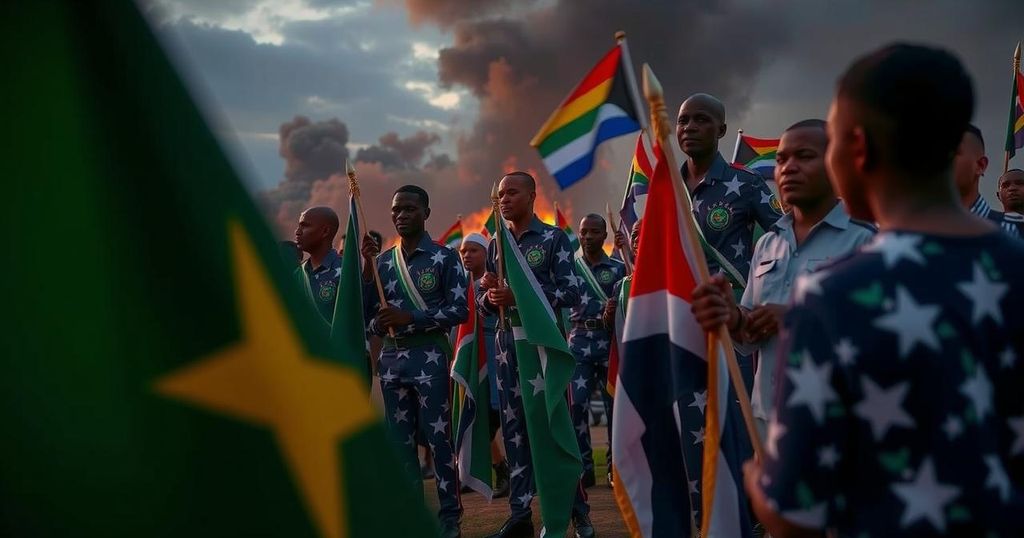Russia’s Veto Blocks UN Efforts for Ceasefire Amid Sudan Crisis

Russia’s veto of a UN resolution for a ceasefire in Sudan has provoked outrage from the UK and US, emphasizing the humanitarian crisis resulting from an ongoing civil war. The resolution, supported by 14 other Security Council members, aimed to halt hostilities and protect civilians. The conflict has led to significant loss of life and displacement, raising concerns over the role of international powers in such crises.
The recent veto by Russia against a proposed UN Security Council resolution, supported by the UK and Sierra Leone, has sparked significant outrage, particularly from the United Kingdom and the United States. The resolution aimed to establish a ceasefire in Sudan, which has been embroiled in a devastating civil war for over 19 months, claiming countless lives and displacing millions. The humanitarian ramifications of this conflict have been described as catastrophic, necessitating urgent international intervention.
British Foreign Secretary David Lammy expressed strong disapproval of the veto, branding it a disgrace and questioning Russia’s commitment to addressing the humanitarian crisis. Meanwhile, US ambassador Linda Thomas-Greenfield accused Russia of obstructing efforts to alleviate the dire situation in Sudan, while simultaneously advancing its own political agenda by playing both sides of the conflict. In response, Russia defended its stance, asserting that the resolution undermined Sudanese sovereignty and allowed Western nations to meddle in the country’s affairs.
The veto precluded the resolution from being adopted, even though the remaining 14 Security Council members had supported it. Sudan’s representative at the UN indicated that the proposed text did not incorporate the clauses requested by Sudan, including a condemnation of the United Arab Emirates’ alleged support for the Rapid Support Forces (RSF), which Sudan accused of war crimes against civilians.
The conflict originated in April 2022, following a power struggle between Sudan’s military and the RSF. Aid workers and activists have criticized the UN for its tepid response to the ongoing conflict, which has exacerbated an already severe humanitarian crisis, with approximately 11 million individuals displaced and many facing starvation.
In light of the geopolitical tensions surrounding Sudan and the differing perspectives on intervention, it is essential for the international community to find a balanced approach that prioritizes human rights and the alleviation of suffering in the region. The remarks from key diplomats illustrate the complexities of international diplomacy in the face of localized strife, prompting calls for a reevaluation of engagement strategies in conflict zones.
The civil war in Sudan has been marked by intense violence between the Sudanese army and the Rapid Support Forces (RSF), fueling a dire humanitarian crisis. Since the outbreak of hostilities in April 2022, the conflict has claimed tens of thousands of lives and displaced over 11 million individuals. The United Nations has faced backlash for its slow response to the crisis, as civilian suffering continues amidst allegations of war crimes and human rights abuses by both warring factions. The backdrop of this conflict is complicated by international interests, particularly involving countries like Russia and the UAE, which influence the dynamics at the UN Security Council.
The veto by Russia has highlighted the geopolitical complexities surrounding the Sudan conflict, illustrating the tensions within the UN Security Council and the challenges in addressing humanitarian crises effectively. With international actors advocating for differing approaches, the urgent need for a resolution that prioritizes the well-being of civilians and acknowledges the sovereignty of nation-states remains a critical issue. As Sudan grapples with a prolonged humanitarian disaster, calls for immediate and cohesive international action continue to resonate.
Original Source: www.bbc.co.uk








